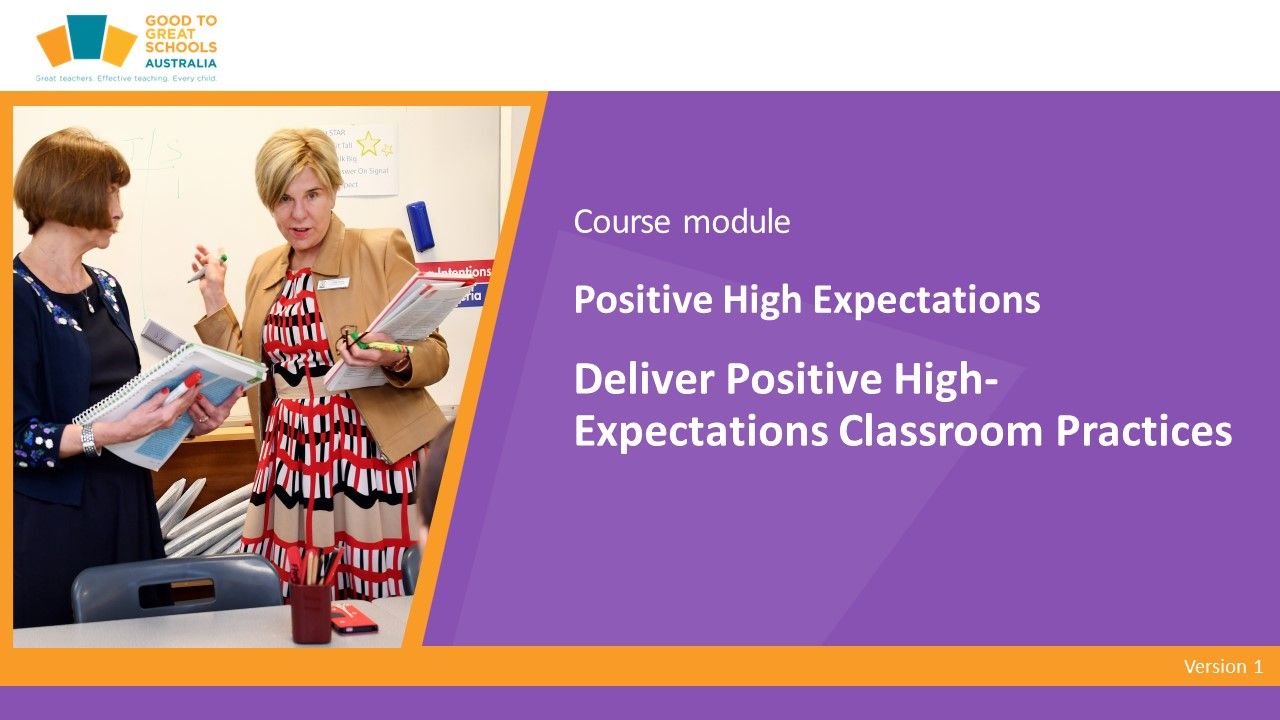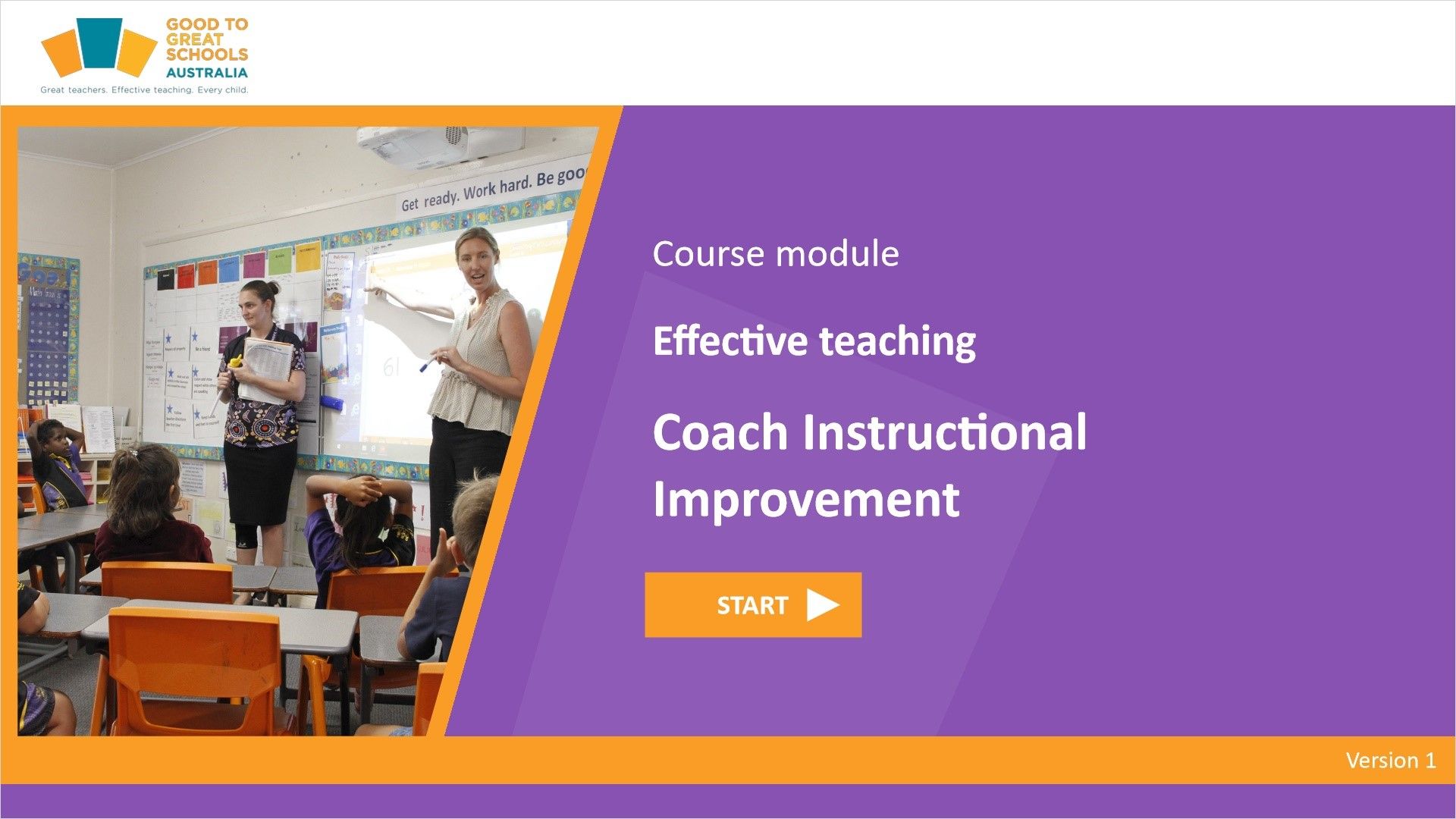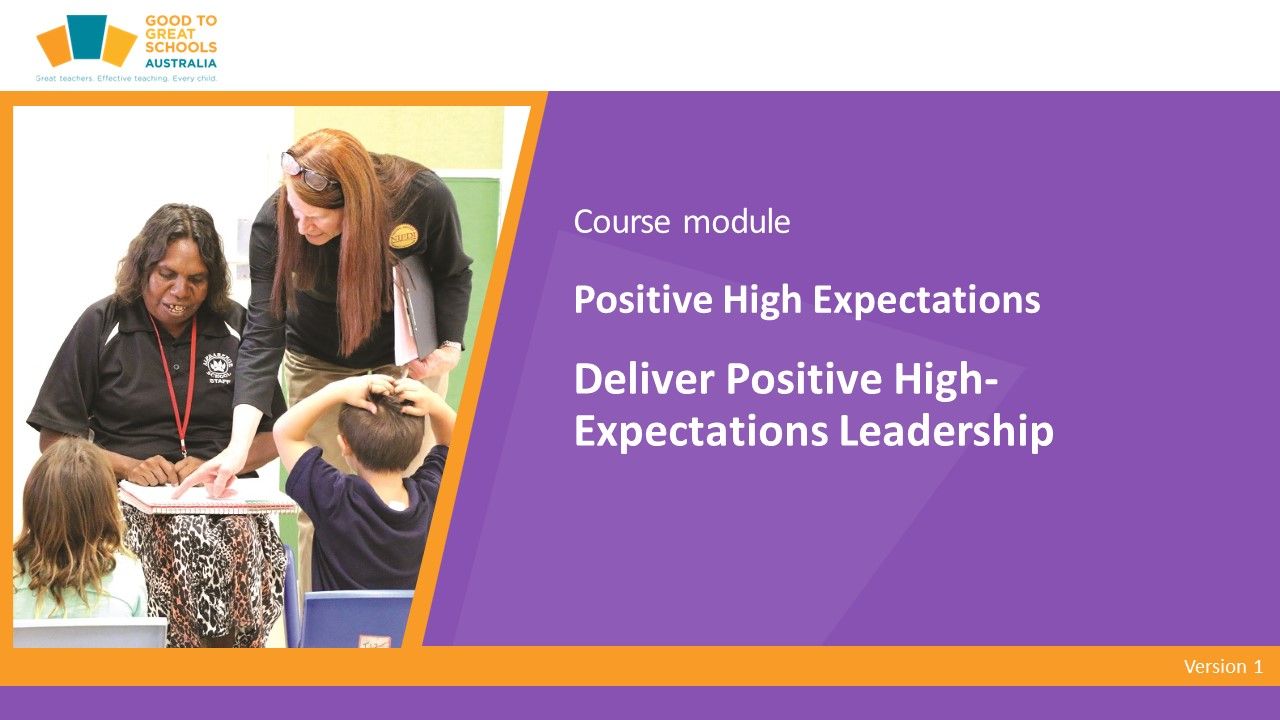Positive High Expectations
Course Modules
Overview

Build Positive High-Expectations School Communities
Positive High-Expectations School Communities is a professional learning module for principals, instruction coaches, teachers and teaching assistants. Participants understand the generic values and behaviours that are consistent with positive high expectations models. They also gain knowledge about the various decision-making procedures based on data and discuss about how to work in partnership with parents, families and communities.
Learning Intents
- Understand the need for change and for a high expectations culture and no excuses approach (2.2.01).
- Communicate to leaders and teaching faculty the need for change (2.2.01).
- Understand effective practices for engaging the community (2.1.04).
- Understand a school’s effective teaching implementation and improvement approach for academics and behaviour (3.1.06).
- Understand school-wide vision, values and how to create and maintain supportive and safe learning environments using positive behaviour interventions and supports (3.4.01).
- Understand school-wide behaviour plan and professional obligations to maintain student safety (3.4.04).
- Understand vision of school and community partnership to drive school improvement (3.8.02). Apply a high expectations culture and a no excuses approach (2.2.01).
- Implement vision, values and positive behaviour interventions and supports consistent with the school-wide behaviour plan (3.4.06).
- Apply effective teaching actions agreed at Community school partnership meetings (3.8.02).
- Demonstrate awareness of local Aboriginal and Torres Strait Islander histories, cultures and languages in lessons and discussions with community members (3.8.02).
- Communicate how student learning and behaviour is improving and link to improvements in instruction (1.3.02).
- Apply development processes to celebrate success, address underperformance and challenge complacency (2.1.04).
- Communicate to leadership and teaching faculty examples of excellent teaching and learning (2.3.02).
- Apply social emotional learning to develop pro-social behaviours and reinforce self-regulation (3.4.01).
- Apply school rules across classrooms and play areas (3.4.01).
- Evaluate effectiveness of classroom behaviour planning on student’s behaviour within the classroom using character strengths, teacher–student game, charts and reinforcers (3.4.06).
- Understand continuum of consequence and how to manage challenging behaviour (3.4.03).
- Demonstrate active monitoring and time-in to mitigate low-level behaviours and discourage escalation and how tiered interventions manage challenging behaviour using time-out, detention, check-in check-out systems and mentoring practices (3.4.03).
- Communicate escalating or threatening behaviours to behaviour management team or principal for intervention (3.4.04).
- Understand link between data analysis and enhanced student results in academics and behaviour (1.3.02).
- Apply data review routines to ensure whole school routinely improves its instructional and behavioural repertoire (1.3.02).
- Understand how to use academic and behavioural data to improve school performance (1.5.04).
- Apply effective processes for using data to improve school performance in academics and behaviour (1.5.04).
- Communicate improvements in school performance to the community using data (1.5.04).
- Understand how to collect and interpret evidence to identify excellent teaching and learning (2.3.02).
- Apply methods for collecting and interpreting evidence to identify and share successful strategies (2.3.02).
- Communicate challenging behaviours to behaviour management team for functional analysis (3.4.03).
- Communicate with community members audience appropriate information about use of technology to drive school improvement (3.8.02).
- Understand the types of student data that are collected to support student learning and behaviour (4.3.02).
- Understand strategies that will enable effective engagement with families and community (1.1.04).
- Understand best practice re standards of consistent behaviours for students, school team and families (1.2.04).
- Communicate standards of consistent behaviours across school and community (1.2.04).
- Apply best practices across school and community (1.2.04).
- Communicate to parents and community ways to support school and their children behaviourally and academically (1.1.04).
- Understand effective practices for engaging the community (2.1.04).
- Understand how to utilise honest conversations to increase parental engagement (2.2.04).
- Apply honest conversations to increase parental engagement (2.2.04).
- Understand importance of parent engagement in improving student outcomes (2.4.01).
- Understand best practices for involving parents in their children’s education (4.4.01).
- Apply knowledge of best practices in helping to develop and deliver strategies to involve parents (4.4.01).
- Demonstrate parent engagement practices to teaching faculty (4.4.01).
Prerequisite
- Learn Effective Teaching Essentials.
Duration
- 12 Lessons.
Assessment
Assessment has three stages:
- Test: Knowledge and skills taught in the lessons
- Appraisal: Practical application in practicing knowledge and skills learned in the lessons
- Mastery evaluation: Delivery with students of the knowledge and skills learned in the lessons.
Certification
Participants are eligible for certification based on attendance and completion of assessment requirements for each module.
- Certificate of Attendance: Complete online training and knowledge and skills tests.
- Certificate of Participation: Pass knowledge and skills video Appraisal.
- Certificate of Achievement: Pass knowledge and skills video Mastery evaluation.

Deliver Positive High-Expectations Classroom
Positive high-expectations schools cultivate a culture that values learning and supports every child to reach their full potential. In this module, participants will learn how to lead a school in teaching values, expectations and character strengths, lead the sharing of data to show improvement and partner with parents in leading positive high expectations.
Learning Intents
- Understand how to develop a professional learning plan that takes into account individual and group learning and behaviour needs (1.3.01).
- Apply professional learning plan so that teaching faculty get regular access to the right training when needed and targeted training that deepens their knowledge and skills in academics and behaviour (1.3.01).
- Communicate how proper training grows leadership capacity (1.3.01).
- Understand the need for change and for a high expectations culture and no excuses approach (2.2.01).
- Apply a high expectations culture and a no excuses approach (2.2.01).
- Communicate to leaders and teaching faculty the need for change (2.2.01).
- Plan training and coaching sessions to ensure all the school team is supported to deliver effective teaching (2.2.05).
- Understand the role of agencies and outside partners that support health, well-being and safety of students (1.4.03).
- Communicate regularly with agencies and outside partners to support students’ health, well-being and safety (1.4.03).
- Plan regular professional conversations (2.1.07).
- Implement cycles of practice that increase professional collegiality, including professional conversations (2.1.07).
- Plan opportunities for collaborative practices in the school (2.3.07).
- Implement practices that allow everyone in the school team to contribute to improvement (2.3.07).
- Review participation of individuals in contributing to school improvement (2.3.07).
- Evaluate ways of improving participation in school improvement efforts (2.3.07).
- Understand how other agencies can support the health, wellbeing and safety of students (2.4.03).
- Apply effective collaborative skills in working with agencies to support students and families (2.4.03).
- Communicate importance of collaborative efforts in ensuring the health, wellbeing and safety of students (2.4.03).
- Understand link between data analysis and enhanced student results in academics and behaviour (1.3.02).
- Apply data review routines to ensure whole school routinely improves its instructional and behavioural repertoire (1.3.02).
- Communicate how student learning and behaviour is improving and link to improvements in instruction (1.3.02).
- Review participation of school leaders and teaching faculty in professional conversations (2.1.07).
- Evaluate participation data and encourage entire school team to participate in collegial activities (2.1.07).
- Understand how to collect and interpret evidence to identify excellent teaching and learning (2.3.02).
- Apply methods for collecting and interpreting evidence to identify and share successful strategies (2.3.02).
- Communicate to leadership and teaching faculty examples of excellent teaching and learning (2.3.02).
- Plan opportunities for reflective practices, structured feedback, peer review and teaching standards (2.3.06).
- Implement cycles of practice that lead to personal improvement of teaching faculty (2.3.06).
- Review observation and student mastery data to determine need for reflective practices, structured feedback and peer review (2.3.06).
- Evaluate personal improvement of teaching faculty based on growth in teaching standards (2.3.06).
- Understand cycles of school practice that increase community engagement (1.3.04).
- Apply practices around community school improvement partnerships to build a community-centred organisation (1.3.04).
- Communicate clearly with parents and community about school improvement efforts to build a positive high expectations school and community (1.3.04).
- Understand the strengths of the community (2.4.04).
- Apply this understanding and harness it to drive improvement (2.4.04).
- Communicate this understanding to the school team (2.4.04).
Prerequisite
- Learn Effective Teaching Essentials
- Build Positive High-Expectation School Communities.
Duration
- 12 Lessons.
Assessment
Assessment has three stages:
- Test: Knowledge and skills taught in the lessons
- Appraisal: Practical application in practicing knowledge and skills learned in the lessons
- Mastery evaluation: Delivery with students of the knowledge and skills learned in the lessons.
Certification
Participants are eligible for certification based on attendance and completion of assessment requirements for each module.
- Certificate of Attendance: Complete online training and knowledge and skills tests.
- Certificate of Participation: Pass knowledge and skills video Appraisal.
- Certificate of Achievement: Pass knowledge and skills video Mastery evaluation.

Coach Instructional Improvement
Coach Instructional Improvement is a professional learning module for instruction coaches. Participants understand their role in leading the school and how to strengthen their practice to achieve instructional improvement in their school. They can embed cycles of practice in their school. They can lead data reviews to collect and analyse data, use the data to problem-solve issues and set actions, and coach teachers to implement those actions so that their teaching is more effective and student results are lifting across the school.
Learning Intents
- Understand the need for change and for a high expectations culture and no excuses approach (2.2.01).
- Apply a high expectations culture and a no excuses approach (2.2.01).
- Communicate to leaders and teaching faculty the need for change (2.2.01).
- Understand how shared accountability leads to achievement of high standards (2.2.03).
- Apply cycles of review, responsibility and shared accountability to achieve high standards (2.2.03).
- Communicate the importance of shared accountability in achieving high standards (2.2.03).
- Understand the need for a culture of continuous improvement (2.3.04).
- Apply principles of continuous improvement across the school (2.3.04).
- Communicate a culture of continuous improvement as a key characteristic of the school (2.3.04).
- Evaluate ways of improving participation in school improvement efforts (2.3.07).
- Understand how effective teaching affects instructional improvement (2.1.01).
- Plan student groups based on placement testing (2.1.06).
- Understand how to use placement test data to place students in their correct levels and programs (2.2.02).
- Apply key practices that support effective teaching and positive behaviour interventions and strategies (2.1.01).
- Apply cycles of practice that support effective teaching implementation (2.1.02).
- Evaluate mastery of effective teaching and behaviour techniques amongst teachers and teaching assistants and provide suggestions for improvement (2.1.05).
- Plan training and coaching as per the professional development plan (2.1.05).
- Implement coaching and feedback cycles of practice (2.1.05).
- Plan regular professional conversations (2.1.07).
- Review participation of school leaders and teaching faculty in professional conversations. (2.1.07).
- Evaluate participation data and encourage the entire school team to participate in collegial activities (2.1.07).
- Review groups, resource setup and schedules throughout the year (2.1.06).
- Evaluate practices around student placement testing, grouping, resource setup and schedules and determine where improvements can be made (2.1.06).
- Apply oversight to delivery of effective teaching, including placement and movement of students in programs (2.2.02).
- Communicate with leadership and teaching faculty how decisions are made regarding student placement and movement to maximise mastery (2.2.02).
- Apply methods for collecting and interpreting evidence to identify and share successful strategies (2.3.02).
- Communicate to leadership and teaching faculty examples of excellent teaching and learning (2.3.02).
- Implement cycles of practice that lead to personal improvement of teaching faculty (2.3.06).
- Motivate school team to seek opportunities for professional growth (2.3.09).
- Model ongoing development through personal participation in professional growth opportunities (2.3.09).
- Coach school team in development of a personal learning plan to progress their development to mastery (2.3.09).
- Coach teaching faculty in identifying coaching and training needs (2.2.11).
- Evaluate improvement efforts based on student mastery data (2.02.6).
- Apply effective collaborative skills in working with agencies to support students and families (2.4.03).
- Communicate the importance of collaborative efforts in ensuring the health, wellbeing and safety of students.
- Plan opportunities for collaborative practices in the school (2.3.07).
- Implement practices that allow everyone in the school team to contribute to improvement (2.3.07).
- Review participation of individuals in contributing to school improvement (2.3.07).
- Embed practices to review effectiveness of processes to improve performance (2.02.14).
- Understand effective practices for engaging the community (2.1.04).
- Understand the importance of parent engagement in improving student outcomes (2.4.01).
- Communicate the importance of parent engagement to teaching faculty as a key aspect of improving student outcomes (2.4.01).
- Plan cycles of practice to cultivate a collaborative and trusting relationship with community (2.4.07).
- Implement practices that cultivate trust between school and community (2.4.07).
- Plan specific strategies for hard-to-reach parents (2.04.08).
Prerequisite
- Learn Effective Teaching Essentials.
Duration
- 12 Lessons.
Assessment
Assessment has three stages:
- Test: Knowledge and skills taught in the lessons
- Appraisal: Practical application in practicing knowledge and skills learned in the lessons
- Mastery evaluation: Delivery with students of the knowledge and skills learned in the lessons.
Certification
Participants are eligible for certification based on attendance and completion of assessment requirements for each module.
- Certificate of Attendance: Complete online training and knowledge and skills tests.
- Certificate of Participation: Pass knowledge and skills video Appraisal.
- Certificate of Achievement: Pass knowledge and skills video Mastery evaluation.

Deliver Positive High-Expectations Leadership
Support Families in Positive High-Expectations Schools is a professional learning module for principals, instruction coaches, teachers and teaching assistants. Participants will learn the components of positive, high-expectations zones and understand how positive, high-expectations zones are characterised by a belief in the potential of every student. They’ll also learn how to partner with parents and understand how to teach students the values, expectations, behaviours and character traits to increase learning and positive behaviour.
Learning Intents
- Communicate to parents and community ways to support school and their children behaviourally and academically (1.1.04).
- Implement regular meetings with parents to reinforce need to meet student’s academic and behaviour needs (1.1.08).
- Develop engagement strategies that reach all parents (1.1.12).
- Promote collaboration with community on strategies to tackle effects of disadvantage on learning and behaviour (1.1.16).
- Communicate clearly with parents and community about school improvement efforts to build a positive high expectations school and community (1.3.04).
- Evaluate community engagement efforts based on academic and behaviour data, making improvements as needed (1.3.08).
- Develop leadership in others through encouraging parents and other community leaders to build consensus and take individual responsibility for implementing change (1.3.12).
- Communicate transparently with information on how students are progressing academically and behaviourally (1.4.04).
- Evaluate school improvement efforts around parental commitment and feedback. (1.4.08).
- Plan ways to work with the community to show how the school is applying resources to support students (1.5.08).
- Articulate a focus on student improvement and promotion of ethical standards throughout the school community that is communicated in improvement plans (1.5.12).
- Understand effective practices for engaging the community.
- Apply development processes to celebrate success, address underperformance and challenge complacency (2.1.04).
- Motivate the school team to engage in cycles of practice that increase parent engagement.
- Model to parents how they can support their students through practical activity around school readiness.
- Coach school team in increasing parent engagement focused on school readiness. (2.1.12).
- Understand how to utilise honest conversations to increase parental engagement (2.2.04).
- Evaluate level of parental participation in classroom visits and work with school team to increase classroom visits (2.2.08).
- Coach school team in effective ways to forge productive links with the community (2.2.12).
- Embed cycles of development, review, revision of school reports that communicate effectively with the community (2.2.16).
- Evaluate current efforts to encourage families to build consensus and make needed improvements (2.3.08).
- Communicate ways the community can use school facilities (2.4.02).
- Evaluate best ways to use technology to deepen parent engagement in student learning (2.4.06).
- Model high ethical standards, support codes of ethics and exercise sound judgement in all community contexts (2.4.09).
- Coach school team in the development and adoption of practices that involve parents in their children’s education (2.4.10).
- Coach school team to implement national/international best practice to help embed a culture of inclusion of families into school and classroom life (2.4.11).
- Model ways of successfully garnering community participation in school efforts (2.4.12).
- Motivate teaching faculty to positively engage parents to maximise their children’s learning (3.8.09).
- Motivate classroom and school improvement with teaching faculty in alignment with vision of the Community school partnership (3.8.10).
- Model implementing plans and case managing students’ progress with families and supporting agencies to teaching faculty (3.8.11).
- Motivate teaching faculty to have honest conversations with parents (3.8.12).
- Embed family engagement practices across teaching faculty that motivate parents to maximise their children’s learning (3.8.13).
- Promote with teaching faculty and community members vision of the community school partnership meetings to drive school improvement (3.8.14).
- Promote with teaching faculty the importance of student’s development milestones and supporting families to reach these by meeting student’s behavioural, physical, social and intellectual development needs (3.8.15).
- Embed honest conversation planning across teaching faculty that reminds, resolve, and reinspire parent’s support (3.8.16).
- Explain to parents their child’s learning and school needs (4.2.12).
- Promote parent participation in classroom visits during learning times through strategies that increase engagement (4.2.16).
- Explain to colleagues ways to provide contextually relevant opportunities for parents to be involved in their children’s learning (4.3.12).
- Promote exemplary ethical behaviour and exercise informed judgements in dealings with community (4.3.13).
- Model high ethical standards, support codes of ethics and exercise sound judgement in all community contexts (4.4.09).
- Explain effective strategies for involving parents in their children’s education to peers (4.4.10).
- Model productive relationships with parents that lead to benefits for student learning and school improvement (4.4.11).
- Explain how building productive links with wider community improves learning and behaviour (4.4.12).
- Lead new peers to develop their professional knowledge, skills and practice to work with parents and community (4.4.13).
- Promote opportunities that engage parents (4.4.14).
- Promote community networks (4.4.15, 4.4.16).
Prerequisite
- Learn Effective Teaching Essentials
- Build Positive High-Expectation School Communities.
Duration
- 12 Lessons.
Assessment
Assessment has three stages:
- Test: Knowledge and skills taught in the lessons
- Appraisal: Practical application in practicing knowledge and skills learned in the lessons
- Mastery evaluation: Delivery with students of the knowledge and skills learned in the lessons.
Certification
Participants are eligible for certification based on attendance and completion of assessment requirements for each module.
- Certificate of Attendance: Complete online training and knowledge and skills tests.
- Certificate of Participation: Pass knowledge and skills video Appraisal.
- Certificate of Achievement: Pass knowledge and skills video Mastery evaluation.
